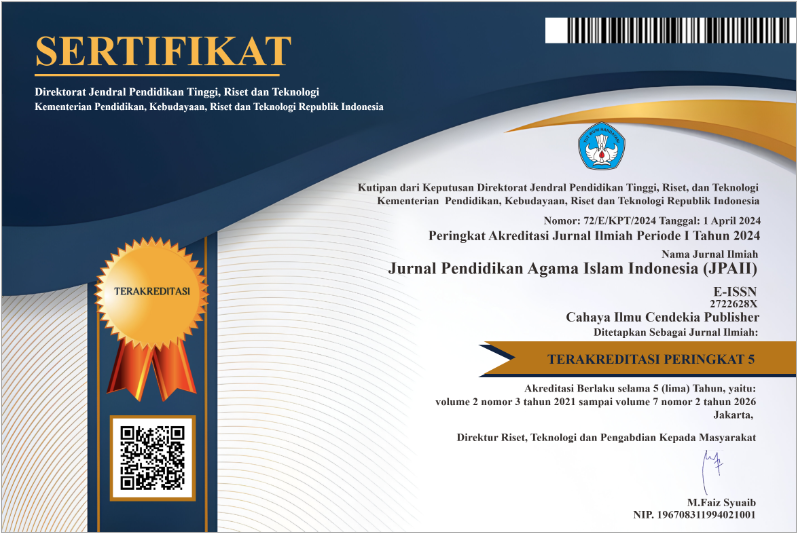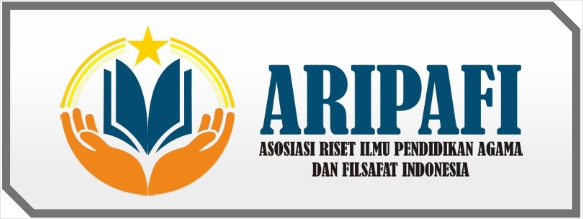Analysis of Forms of Collaboration between Islamic Religious Education Teachers and Students' Parents
Abstract
Purpose of the study: The purpose of this study is to find out and analyze what collaboration is carried out between Islamic religious education teachers and parents in instilling character values in students, and identify the constraints in carrying out collaboration between Islamic religious education teachers and parents.
Methodology: Methods of data collection in this study using observation, interviews, and documentation. The data processing and analysis techniques go through three stages, namely data reduction, data presentation, and drawing conclusions.
Main Findings: The results of the study showed that the forms of cooperation that existed between Islamic Religious Education teachers and parents varied, namely parenting classes, class forums, WhatsApp groups, contact books, direct meetings between teachers and parents, and home visits. The obstacle factors faced certainly vary in each collaboration carried out such as the absence of parents, the lack of understanding of parents in educating students, and the lack of openness from parents to teachers in problems faced by students.
Novelty/Originality of this study: he learned about the novelty of this research about Collaboration Between Islamic Religious Education Teachers and Parents in Instilling Character Values in Students in Elementary Schools.
References
S. Ramli, R. Novanda, M. Sobri, and E. Triani, “The Impact of Student Responses and Concepts Understanding on the Environmental Care Character of Elementary School Students,” Int. J. Elem. Educ., vol. 6, no. 1, pp. 48–57, 2022.
K. Kamid, R. Rohati, H. Hobri, E. Triani, S. Rohana, and W. A. Pratama, “Process Skill and Student ’ s Interest for Mathematics Learning : Playing a Traditional Games,” Int. J. Instr., vol. 15, no. 3, pp. 967–988, 2022, doi: . https://doi.org/10.29333/iji.2022.15352a.
K. Kamid, D. A. Kurniawan, and A. M. Nawahdani, “Scientific Learning Model: Analytical Thinking and Process Skills in Mathematics,” J. Educ. Res. Eval., vol. 3, no. 6, 2022.
A. Rahayu and D. D. Romadona, “Deskripsi Implikasi Sosial dari Fisika , Sikap Terhadap Penyelidikan dalam Fisika dan Adopsi dari Sikap Ilmiah,” SchrödingerJournal Phys. Educ. (SJPE, vol. 1, no. 1, pp. 13–17, 2020.
N. Y. Sari, “Peningkatan Hasil Belajar IPS Materi Sumber Daya Alam Melalui Strategi Peta Konsep Pada Siswa Kelas IV MI,” J. Soc. Knowl. Educ., vol. 1, no. 3, pp. 62–69, 2020, doi: 10.37251/jske.v1i3.354.
D. S. Juniwati, “Perbedaan Model Pembelajaran Dicovery Dan Model Pembelajaran POE (Predict-Observe-Explain) Pada Materi Perpajakan Di Kelas XI,” J. Soc. Knowl. Educ., vol. 1, no. 1, pp. 27–32, 2020, doi: 10.37251/jske.v1i1.47.
I. W. E. Santika, “Pendidikan Karakter pada Pembelajaran Daring,” Indones. Values Character Educ. J., vol. 3, no. 1, pp. 8–19, 2020.
S. Sulfasyah and J. Arifin, “Implikasi Pendidikan Nonformal Pada Remaja,” Equilib. J. Pendidik., vol. 4, no. 2, pp. 1–8, 2016, doi: 10.26618/equilibrium.v4i2.506.
H. Sabil, D. A. Kurniawan, R. Perdana, F. I. Putri, and S. E. Septi, “The Influence of Tarompa E-Module on Peace-Loving Characters,” J. Pendidik. Indones., vol. 12, no. 2, pp. 283–292, 2023.
M. J. Ismail, “Pendidikan Karakter Peduli Lingkungan Dan Menjaga Kebersihan Di Sekolah,” Guru Tua J. Pendidik. dan Pembelajaran, vol. 4, no. 1, pp. 59–68, 2021, doi: 10.31970/gurutua.v4i1.67.
Mulyati, F. I. Putri, and Deswalman, “Efforts to Improve Student Activities and Outcomes in Physics Learning Using the Two Stay Two Stray Technical Cooperative Learning Model at Senior High School,” Integr. Sci. Educ. J., vol. 4, no. 1, pp. 30–35, 2023, doi: 10.37251/isej.v4i1.294.
D. Daud and Y. Triadi, “Implementasi Pendidikan Karakter Cinta Tanah Air dalam Proses Pembelajaran di Sekolah Dasar,” J. Basic Educ. Res., vol. 2, no. 1, pp. 15–19, 2021, doi: 10.37251/jber.v2i1.130.
I. Ngkoti, “Expression of Students’ Elementary School on Planting Lesson,” J. Basic Educ. Res., vol. 2, no. 1, pp. 6–9, 2021, doi: 10.37251/jber.v2i1.112.
A. Permanda, “Hubungan Antara Motivasi Belajar dan Hasil Belajar Kelas X IPA 1 SMAN 1 Batanghari,” SchrödingerJournal Phys. Educ., vol. 2, no. 1, pp. 17–19, 2021, doi: 10.37251/sjpe.v2i1.456.
S. Ramli, R. Novanda, M. Sobri, E. Triani, and S. E. Septi, “The Effect of Student Responses on Environmental Care Characters and Student Learning Outcomes,” Eurasian J. Educ. Res., vol. 99, pp. 112–126, 2022, doi: 10.14689/ejer.2022.99.007.
D. A. Kurniawan, N. N. Qoidah, M. Zannah, and E. Triani, “Character Values of Tenth-Grade Students during Learning Physics in Vector Material,” J. Pendidik. Indones., vol. 12, no. 1, pp. 116–123, 2023.
F. T. Aldila, E. F. S. Rini, S. W. Oktavia, N. N. Khaidah, F. P. Sinaga, and N. Sinaga, “The Relationship of Teacher Teaching Skills and Learning Interests of Physics Students of Senior High School,” EduFisika J. Pendidik. Fis., vol. 8, no. 1, 2023.
M. Baginda, “Nilai-Nilai Pendidikan Berbasis Karakter pada Pendidikan Dasar dan Menengah,” J. Ilm. Iqra’, vol. 10, no. 2, pp. 1–12, 2018, doi: 10.30984/jii.v10i2.593.
A. Asrial, S. Syahrial, D. A. Kurniawan, and M. D. Zulkhi, “The Relationship Between the Application of E-Modules Based on Mangrove Forest Ecotourism on The Peace-Loving Character of Students,” J. Educ. Technol., vol. 5, no. 3, p. 331, 2021, doi: 10.23887/jet.v5i3.34043.
Kamid, D. A. Kurniawan, R. Perdana, B. Widodi, E. Triani, and P. Fadillah, “The Persistence Character and Math Processing Skills of Elementary School Students in Thematic Learning,” J. Ilm. Sekol. Dasar, vol. 7, no. 2, pp. 363–373, 2023.
S. W. Octavia, Neni Septiani, F. Sinaga, and N. N. Qoidah, “Analysis Of The Relationship In Learning Interest To Learning Outcomes Static Fluid Material In Senior High School,” J. Ilm. Ilmu Terap. Univ. Jambi, vol. 7, no. 1, pp. 22–26, 2023.
Astalini, Darmaji, D. A. Kurniawan, S. W. Oktavia, E. Triani, and M. Z. Azzahra, “The Exploration of Character Values in Physics Learning on Momentum, Impulse, and Collision Materials,” J. Educ. Res. Eval., vol. 7, no. 2, pp. 277–284, 2023, doi: 10.23887/jere.v7i2.52381.
M. Aizinsh, S. W. Oktavia, Riko Firmansyah, and Ruttinawati, “Exploration Of The Character Of Cooperation In Physics,” EduFisika J. Pendidik. Fis., vol. 8, no. 1, pp. 23–36, 2023, doi: 10.59052/edufisika.v8i2.26526.
A. Zabidi, “Kreativitas Guru Dalam Memanfaatkan Teknologi Sebagai Media Pembelajaran Pai Di Sd Sekecamatan Bawen Kabupaten Semarang tanggungjawab yang sangat besar . Salah satu peran seorang gurudengan kompetensi ilmu untuk anak didik yang diajar . Keadaan tersebut d,” J. Inspirasi, vol. 3, no. 2, pp. 128–144, 2019.
Copyright (c) 2023 Puri Khoirunas, Siti Noor Mawar A. Rahman

This work is licensed under a Creative Commons Attribution-NonCommercial 4.0 International License.
Authors who publish with this journal agree to the following terms:
- Authors retain copyright and acknowledge that the Jurnal Pendidikan Agama Islam Indonesia (JPAII) is the first publisher licensed under a Creative Commons Attribution 4.0 International License.
- Authors are able to enter into separate, additional contractual arrangements for the non-exclusive distribution of the journal's published version of the work (e.g., post it to an institutional repository or publish it in a book), with an acknowledgment of its initial publication in this journal.
- Authors are permitted and encouraged to post their work online (e.g., in institutional repositories or on their website) prior to and during the submission process, as it can lead to productive exchanges and earlier and greater citation of published work.






.png)
.png)





















